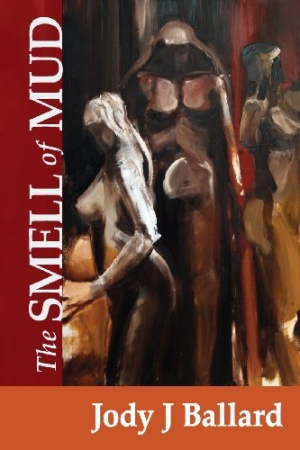The Smell of Mud
The journals of a prostitute help a young girl learn what it means to overcome hardship and become an independent woman.
The sex trade has been a favorite theme of authors for hundreds of years, and why wouldn’t it be? The world’s oldest profession contains all the necessary ingredients for a humdinger of a story: sex, heartache, bad luck, revenge, and redemption. Jody J. Ballard’s debut novel, The Smell of Mud, explores a lot of this territory in her story of Elizabeth, a prostitute living in the gritty mining town of Granite, Montana during the late 1800s.
It begins in the present day when teenager Lizzy discovers the mysterious Elizabeth’s journals hidden in her family’s attic. She is both intrigued and puzzled by the journals that speak openly about prostitution. Lizzy seeks out her mom and grandmother to help her understand what Elizabeth experienced, and together they learn that she was a happily married wife and mother until the murder of her husband and only daughter. Suddenly alone with nothing but her husband’s horse and with little in the way of skills, she turns to prostitution to support herself. Along the way, she rescues several others who have met with similar misfortune, and together they build new lives. Both Lizzy and her mother benefit from the wisdom gleaned. Lizzy uses the journals to understand sex, love, and what it means to be an independent woman. Her mother learns how to put romance back into her marriage.
What makes this plot line especially interesting is that it alternates between Lizzy’s present day point of view and Elizabeth’s nineteenth-century one, showing that women from both eras face the same doubts and fears. This device keeps the story moving along at a compelling pace even when plot problems threaten to send it off course.
One problem is that The Smell of Mud has an improbable plot development early on. It’s the conundrum of why, when her family is murdered, doesn’t Elizabeth tell the sheriff, or a friend, or anyone at all? Why does she wander off into the wilderness and land feet first in a brothel? The story would have gotten off to a better start if this element, which is so pivotal to laying the groundwork of the plot, had been further refined.
There is much soul searching by the characters, which can no doubt be attributed to Ballard’s thirty years working as a clinical therapist. She digs deep, getting to the root of the characters’ motives and does a good job exploring the territory of grief, shame, and regrets. At one point early in the story Elizabeth wonders whether she will ever recover from her tragedy: “Winter on the mountain reached into my heart. While I tried to warm myself to everyone, my heart remained as impenetrable and cold as the granite we lived on.” Occasionally though, the plot line gets bogged down by rehashing the same inner turmoil.
The Smell of Mud stumbles a bit with regard to editing. Auto-correct makes for some confusing sentences, and punctuation is left out every so often. None of this is major, and will not distract the reader.
Ballard’s insight into the human dilemma combined with the fascinating subject matter ensure that this is a story worth telling. Those who enjoy historical fiction, and are interested in women who have faced hardship and overcome it, will enjoy The Smell of Mud.
Reviewed by
Diane Prokop
Disclosure: This article is not an endorsement, but a review. The publisher of this book provided free copies of the book and paid a small fee to have their book reviewed by a professional reviewer. Foreword Reviews and Clarion Reviews make no guarantee that the publisher will receive a positive review. Foreword Magazine, Inc. is disclosing this in accordance with the Federal Trade Commission’s 16 CFR, Part 255.

